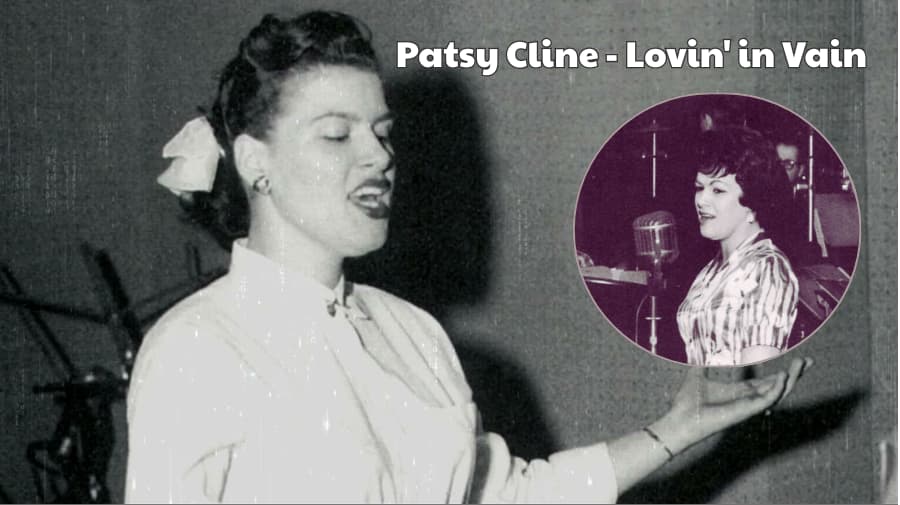
A Lament for Unrequited Love, Echoing Through Time
There are some songs that, from the very first melancholic strum or the initial quivering vocal, seem to carry the weight of countless untold stories, of whispered regrets and the silent ache of a broken heart. For many, one such song is Patsy Cline‘s “Lovin’ in Vain.” Released in 1961 as a B-side to “Have You Ever Been Lonely (Have You Ever Been Blue),” this poignant ballad, despite its initial secondary billing, carved out its own indelible space in the annals of country music history. While it didn’t achieve the same chart-topping success as some of Cline‘s other anthems, “Lovin’ in Vain” stands as a testament to her unparalleled ability to imbue every note with raw, unvarnished emotion. It wasn’t a Billboard Hot 100 smash, nor did it climb the country charts in the same dominant fashion as “Crazy” or “I Fall to Pieces.” Its impact was quieter, more insidious, seeping into the collective consciousness through radio airwaves and the tear-stained moments of countless listeners. Its true chart position wasn’t measured in numbers, but in the depths of the human heart it touched.
The story behind “Lovin’ in Vain” is as intrinsically linked to Patsy Cline‘s own life and artistic journey as any song she recorded. By 1961, Cline was already a star, albeit one who had traversed a path fraught with challenges and personal heartache. She had experienced the highs of early success and the subsequent struggles to maintain momentum, all while navigating the complexities of her personal relationships. This particular track, penned by the songwriting duo Fred Rose and Hank Williams Sr. (under his pseudonym Luke the Drifter), feels as if it were tailor-made for Cline‘s unique vocal delivery. It’s a classic example of a song that found its perfect interpreter, a synergy between lyric, melody, and voice that elevates it far beyond mere musical composition. One can almost picture Patsy in the studio, her eyes closed, channeling every past disappointment and every unfulfilled longing into the microphone, transforming simple words into a universal lament.
At its core, “Lovin’ in Vain” is a powerful and heart-wrenching exploration of unrequited love, of pouring one’s heart and soul into a relationship that offers no reciprocation. The lyrics paint a vivid picture of a protagonist caught in a cycle of devotion and despair, clinging to the fading embers of a love that was never truly there. Phrases like “My heart keeps telling me to love you / But my mind says it’s lovin’ in vain” capture the agonizing internal conflict familiar to anyone who has ever loved someone who couldn’t, or wouldn’t, love them back. It’s a song about the realization that despite all efforts, all sacrifices, the object of affection remains distant, unattainable, and ultimately, uncaring. This isn’t just a breakup song; it’s a song about the crushing weight of knowing, deep down, that the connection you crave simply doesn’t exist. It speaks to the futility of chasing a phantom, of investing emotional capital into a bankrupt enterprise.
For older readers, “Lovin’ in Vain” undoubtedly evokes a flood of memories. Perhaps it was the song playing softly on the radio during a lonely night, or the soundtrack to a quiet reflection on a past relationship that never quite bloomed. It’s a reminder of youthful infatuation that ended in tears, or perhaps a more mature understanding of the intricate dance of human connection, where sometimes, despite our best intentions, paths simply diverge. The raw vulnerability in Cline‘s voice makes it feel less like a performance and more like a shared experience, as if she herself is sitting beside you, recounting her own heartache, making you feel less alone in yours. The song’s enduring appeal lies in its timeless theme: the universal pain of loving someone who doesn’t love you back. It’s a sentiment that transcends generations, always finding new ears to resonate with, new hearts to console. And as the final, lingering notes fade, one is left with a profound sense of empathy, a gentle understanding that sometimes, the greatest love we give is truly given in vain, yet somehow, it leaves an indelible mark on our souls.